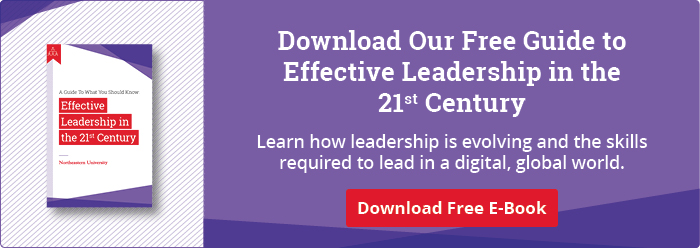In 2014, the city of Flint, Michigan, changed its water supply from Detroit-supplied Lake Huron water to the Flint River as a cost-saving measure. Shortly after the switch, residents voiced concerns about the water color, taste, and smell, and reported health concerns, such as skin rashes—many of which were ignored by the government. More than a dozen deaths and hundreds of illnesses have since been linked to the tainted water supply.
The Flint water crisis is one extreme example of a failure in ethical leadership, says Chris Brooks, a professor of leadership at Northeastern University. It’s a case study in the effects of considering only the bottom line, decision making that doesn’t appropriately weigh risks, and negligence.
“When we start thinking about the profit only and don’t take into consideration the dramatic effect that some of those decisions can make either directly or indirectly, it becomes a failure of the system,” he says. “There were a lot of elements in play that contributed to the Flint water crisis, and one of them was certainly ethical leadership.”
What is Ethical Leadership?
Ethical leadership is defined in two parts, Brooks says: compliance and adherence to rules, and what leaders can do to make the world better.
“Ethics is saying, ‘This is how we ought to be looking at things, how it ought to be, and how we should improve,’ which is a real practitioner’s outlet,” he says. “We also have to be reflective in looking at what people have done in the past and the theories and concepts and ideas that are found in that philosophical notion of what it truly means to be wise.”
Becoming a more ethical leader isn’t about checking off boxes in compliance, it’s an ongoing process that leaders need to regularly reevaluate and rethink. To become a more ethical leader, professionals need to polish their observational skills, develop their own sets of values, encourage healthy discourse among their teams, learn to think subjectively and objectively, and embrace their acquired wisdom.
Download Our Free Guide to Effective Leadership in the 21st Century
Learn how to develop the skills required to lead effectively in today’s digital, global world.
Five Ways to Become a More Ethical Leader
1. Polish Your Observational Skills
It’s easy for leaders to fall into a routine and pay attention only to what’s directly in front of them—their daily agenda, immediate meetings, and short-term deadlines, Brooks says. That complacency, however, can cause leaders to inadvertently turn a blind eye to broader changes that may be occurring. Without critical thinking and observational skills to identify these changes, that blindness could have repercussions and consequences down the line.
“You need to be able to notice when something just doesn’t seem right and know how to ask the right questions,” he says. “You need to be sensitive to [the environment] around you.”
Brooks references a metaphor often used in sensitivity studies:
I think of the example of “boiling a frog.” Frogs are only boiled (for eating) when the water temperature is slowly turned up, because they don’t sense the change in temperature—they just slowly become used to the circumstances. But, if put in hot water to begin with, frogs will jump out immediately, sensing the danger or change.
He says that, as leaders, we are often like the frog—sensitive to quick and apparent crises, but slow to recognize incremental problems. Brooks notes that both of these instances can be troubling or problematic, so leaders must consistently analyze, process, and gather information—even among the people and situations with which they are most familiar.
2. Develop a List of Values
Think about five people that you respect, list their characteristics, and then ask yourself why those characteristics are important to you. This exercise will help you define your own core values and determine whether you’re living up to and exhibiting them yourself, Brooks says.
“More often than not, you’ll find a correlation between the characteristics on your list and those that you value,” he says. “It’s a pretty powerful way for people to check themselves to see whether or not they’re becoming the people they admire.”
Periodically review your list of core values to check in on whether or not you’re adhering to them in both your personal and professional lives, Brooks recommends.
3. Encourage Discourse
Leaders should encourage discourse and debate, which is often easier said than done, Brooks says. Discourse and debate are often misinterpreted by others as threatening, particularly when hot-button issues are being discussed, he says.
“Discourse isn’t about changing opinions, it’s about having an open dialogue and open lines of communication so we can de-escalate situations and better understand where everyone is coming from,” he says. “People assume that when there’s discourse, we’re all supposed to end by agreeing with each other—but that’s not the point. The point is to end the discussion with a level of respect for each other so we can go on with the work we need to do.”
Discourse is an essential tension that people need to become comfortable with, Brooks says. Both the truth and someone’s perception of the truth are equally valid, which is an understanding all leaders need to develop.
4. Honor Both Subjective and Objective Thinking
Subjective thinking refers to personal perspectives, feelings, or opinions that enter the decision-making process. Objective thinking refers to the elimination of subjective perspectives, resulting in thinking that is based purely on hard facts. Some leaders may struggle in putting those two perspectives together, Brooks says.
“All of us have our own perspective on the truth. Subjectivity can cloud that judgement: If I want to be selfish and see things a certain way, that can be problematic,” he says. “This is about the ability to bring the subjective and objective together to look for alignment.”
5. Embrace Your Wisdom
Knowledge and wisdom are not mutually exclusive, Brooks says. While knowledge is abundant in society today, wisdom is developed over time and is directly connected to the ability to step back from situations and suspend judgement, he says.
“Wise people tend to be a bit more thoughtful about things. They pull back from making rushed decisions,” he says. “They don’t lump everyone together in the same category, and they’re very self-aware.”
Wise, ethical leaders have perfected this art. The more you’re able to practice this on a daily basis and hold yourself accountable, the faster you’ll acquire wisdom and be seen as a wise, ethical leader.
“People are imperfect and we all make mistakes. Ethical leaders have the willingness to wake up every day and work on these five things,” Brooks says. “If we improve a little bit every day, we’ve done our job. Evaluation of our ethics and consistent reevaluation of them is necessary for all leaders.”
To learn more about how to develop the leadership skills of today’s most effective leaders, download our free guide below.







Related Articles
5 Practices of Exemplary Leaders
Master’s Degree Comparison: Sports Leadership vs. Sports Management
How to Become a Sports Administrator